West of the Fracked Lands
Can you be reborn on a dying planet?
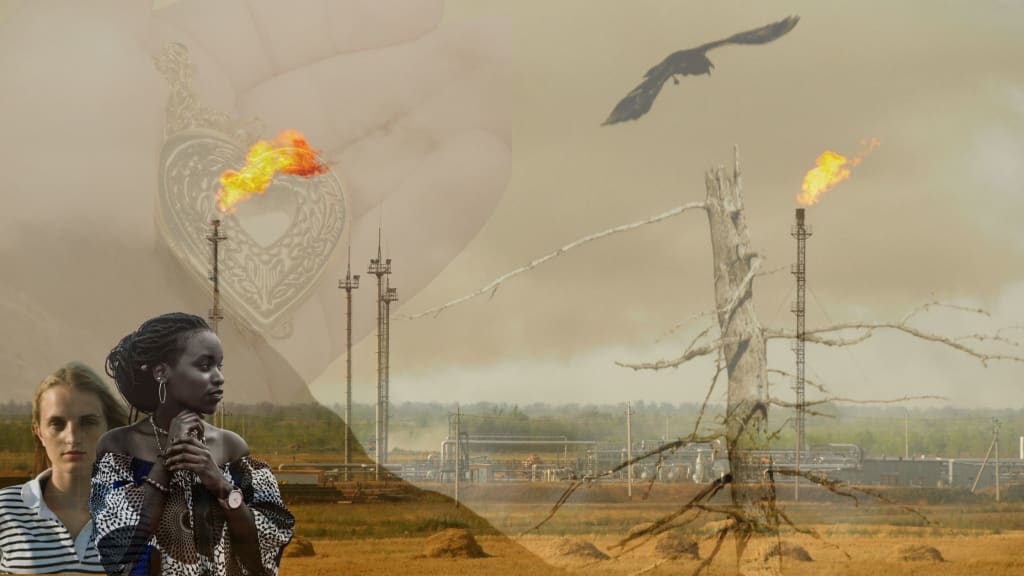
I.
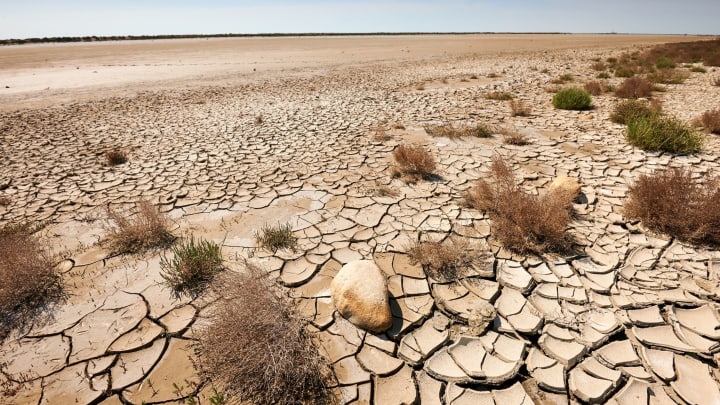
I drop my pack at my feet as I step under the scraggly shade of a tall jackpine at the edge of the wildwood. The relief when I close my eyes is immediate, a black curtain dropping on the fir greens and birch whites swimming across my vision in the blazing heat. It’s hard to believe that the first Somali refugees coming to work in the gas and oil fields last century were called "ciyaal baraf," children off the snow.
It’s been a long time since this part of the Dominion had any kind of snow, I think, as I look back. Somehow, I’ve survived the trek across the Scorch Zone: miles of cracked, parched earth between here and work camps that lie beyond the horizon. The Scorch Zone is the used-up Cree land that Canadian, later Dominion, executives oh-so-graciously gave back after they’d extracted everything they could — oil, gas, the Earth’s very bone marrow.
I've just pulled my long braids off the back of my sweaty neck into a knot on the top of my head, and am still trying to catch my breath, when gravity suddenly shifts under me.
A fracking quake.
I dig my boots into the earth, trying to stay upright despite the shaking. The death throes of a dying planet. But the dehydration has made me dizzy. I lose my balance and tumble down. My head smacks something sharp, and everything goes still.
II.
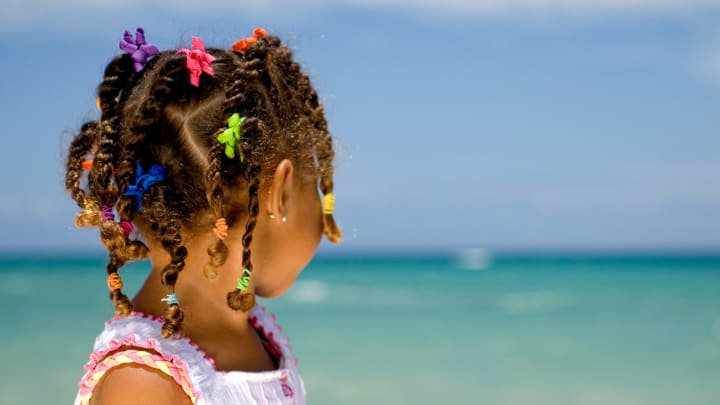
Slowly, as if wafting on a gentle breeze, the salty smell of the sea fills my nose. I hear a child's giggles as the waves lap at the dark skin of my ankles. It takes a moment for me to realize the laughter is mine. It takes a bit longer to realize that this can’t possibly be happening.
Behind me, a woman’s voice trills sweetly, full of love and comfort. It makes me brave and I wade a little further into the water. Eventually, she calls out to me in our language. Don’t go too far, little one.
I turn back, beckoning her with my greedy palms outstretched.
“Hooyo," I coo, in both worlds.
Mother.
And then I roll over and throw up into the dirt.
III.
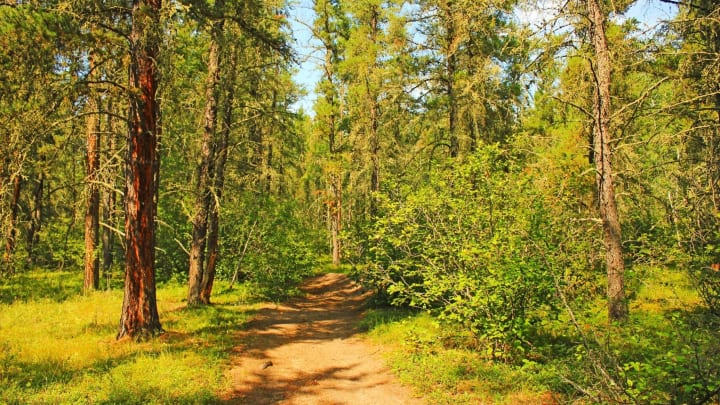
She comes to me like a leopard in the twilight. The crack of a snapped twig and a low snarl from deep in her chest are the only warnings I get before she slaps a hand over my mouth. All sharp white teeth and flashing amber eyes.
By the time she finds me, I've forgotten my own name. I'm an animal thing — the leftover meat of a person. Instinct alone compels me to lap at the creek water and keep moving through the trees. I am not hard to catch.
When she looks me in the face, her eyes go wide with surprise. Her grip slackens, but I don't move. Don't speak. In fact, I stop noticing anything at all … except the necklace: hanging from a thin golden chain, nestled in the hollow of her throat, is a small heart-shaped locket.
Grief screams in my chest, wrenching me apart atom by atom. And then everything goes black.
IV.
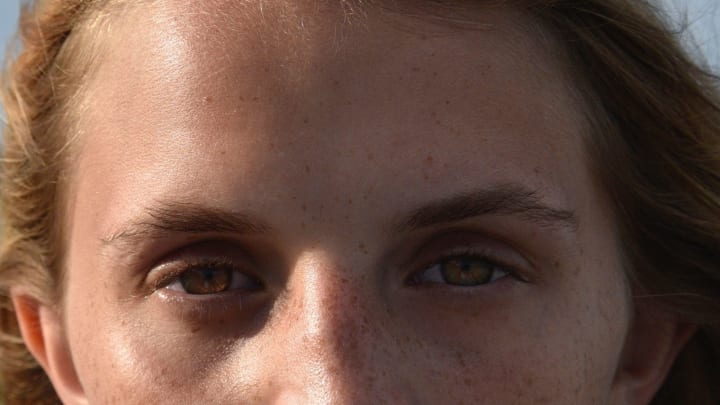
Ximena. That's her name, she says when I wake up a day later. She worked in a gas plant north of mine. “Bullshit office stuff”, she adds, though it's obvious from her light skin that she was, of course, working the desk.
I tell her about drinking the creek water after holding out as long as I could. You'd have to be either stupid or desperate to drink anything in the fracked lands that wasn't bottled or vacuum-sealed. Everything else was full of poison as old as the dinosaurs and whatever toxic soup we used to boil it out the earth.
While I speak, she toys with the locket at her neck. I should look away, but I don’t. Just like the one Astur wore, I can't help but think. The memory of her punches me in the gut. Big, brown eyes. Toothy smile. Little afro that even the sourest white nuns at the camp school couldn't tame. I try to think of something — anything — else to talk about before the memory suffocates me.
“Why’d you leave?” I ask Ximena to head off any questions of her own.
She hesitates. “Why does anyone leave?”
I grunt. Everyone has a story. And one is pretty much like any other. Life is miserable enough that some of us refugees run, thinking escape is possible. Thinking that the threat of getting deported actually means getting deported. Like the Dominion would ever spend the money or the fuel flying us back home. Nobody leaves the fracked lands.
“So, let me guess,” I sigh, “you’re heading west?”
Ximena shrugs, not meeting my eye.
Assuming a runner makes it out of camp, the only way to go is west. Make it over the Rockies and settle down in Cascadia Colony, a continental west coast mecca for runners like us, who had scrambled to accept climate visas from Dominion as rising seas swallowed up our homelands, not knowing what we were in for.
Ximena's eyes flick back to me. “What do you know about Caravan?”
I laugh grimly. “Wishful thinking. It's a bedtime story for 'fugee daydreamers wanting to escape a life on the rigs."
If you believe in fairy tales, word has it that an underground railroad of sorts called Caravan will guide you over the mountains and get you Colony papers.
Suddenly I feel bad for Ximena, who clearly still has something to live for. “If you’re counting on Caravan, you’ll never make it," I add, a little more gently this time.
Ximena snorts. “Not with you around, loca. You almost got us captured back there, stumbling around back there. This place is crawling with drones during the day”
“Drones?”
“Of course. Dominion can't let its dirty little secrets out can it? Something tells me it’d be harder to get oil slaves if the UN knew all the climate refugees were getting shunted into work camps and an early grave.” She gives me a once over. “I’m surprised you’re not dead already. Did you really think you could make a run for it solo?”
“I didn’t think about anything,” I retort shortly.
Ximena raises an eyebrow, but she doesn’t press further. She’s not really looking for an answer. Not yet. It’s enough that I'm clearly no catcher, hunting 'fugees runners down like dogs.
“Caravan’s out there, chica,” she says. “Believe it.”
“Anyway. What’s your story?” I ask, changing the subject. “You’re just as alone out here as me."
“Yeah, well,” Ximena seems to deflate. “I wasn't always.” She gets up and puts a hand to her eyes, squinting east.
I follow her gaze. A thin ripple of orange is visible in the distance.
She turns back to me. “Wind’s blowing southeast — away from us. Should be okay. ”
But it isn’t.
V.
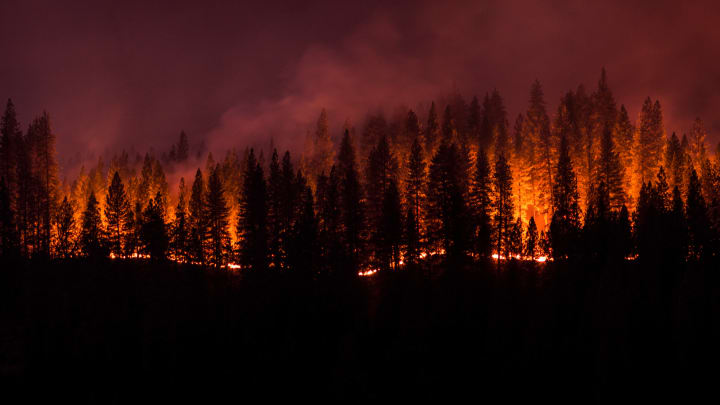
We trudge through a thin haze for a few days, clutching damp rags over our noses and mouths. The smoke isn’t bad, at first, and Ximena always seems to find the narrow deer paths between the trees.
Then the wind shifts and the fire whips around towards us.
Soon, the only good thing is that the smoke is so thick that the drones have stopped flying overhead. Either Dominion’s worried they’ll lose the tech in the wildfire or they figure the fire will finish off whoever’s out here. Not a terrible wager.
The heat is bearing down on us as we run flat out. Ximena trips on a root and sprains her ankle. She curses loudly in a stream of Spanish. Neither of us says it, but we know what this means. I put my arm around her waist and we hobble along a narrow creek until we find a muddy cave. I'm coughing loudly by the time we huddle inside.
“Asthma?” Ximena asks.
“Like everyone else raised up in the fracked lands."
She digs in her pack for a minute, then throws me a puffer.
“Where the hell’d you get this?” I gasp. Medicine is kept strictly on lock by the shift supervisors.
"Colony." She slides to the cave floor, her pale face smeared with grey ash. I inhale deeply twice and offer the puffer back.
She holds a hand up and shakes her head. “Keep it.”
We sit in silence for a minute or two. Then Ximena opens up the necklace. In the dark, as time burns away, we share secrets like they are medicine. She shows me the small picture folded inside one half of the heart: a lively looking girl with umber skin, her eyes crinkled in a wide smile, underneath a high forehead and long arching eyebrows. She could almost be me.
"Dalia," is all Ximena says.
“Somali,” I ask?
"On her mother's side. They escaped about 10 years ago. got as far as Jasper. Only Dalia was recaptured just before the Colony border. We figured they took her back to camp since she was just a kid. Took years to track her down."
"She's why you're here?"
Ximena nods. "Her mother sent me to bring her home. Took nearly six months to convince her I was telling the truth.”
I study the grief etched in Ximena’s face and can guess what happened during those six months. “What happened to her?” I ask softly.
“Unforeseeable workplace accident,” Ximena says in a mock formal tone. She brushes a tear from her face, angrily. “Stupid.”
There are so many ways for us to die in the fracked lands.
My story tumbles out. Of how Astur’s dad got caught up in the 'fugee gangs. How one night, as Astur sat doing homework at the table, Dominion security busted into our room in the barracks and shot the place up. How the heart-shaped locket — a gift from her father and still too big for her five-year-old bones — seemed to hover in the air as she sailed backward in a slow-motion arc. How I started running so I wouldn't feel anything else.
We’re silent for a time.
“You’re Caravan, aren’t you?” I venture.
Ximena leans back against the wall. “I was heading back to take the news back to Dalia's mother, at least.”
We both look at her ankle.
“Will you do it?” she asks.
I swallow and nod.
Ximena tells me what I need to know, then fastens the locket around my neck. She kisses my cheek and pulls away with a smile. “Run,” she whispers.
And I do.
I.
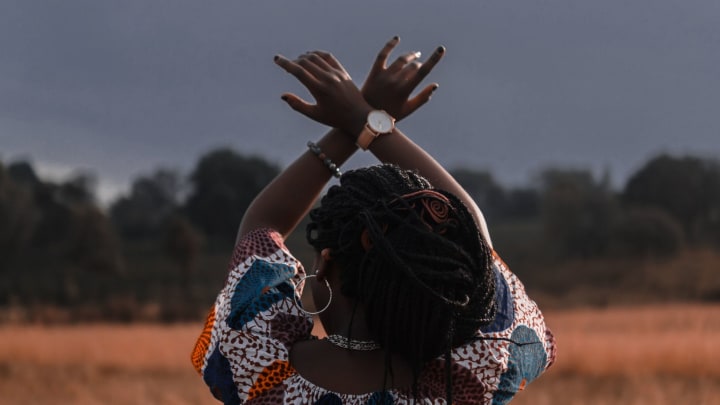
I make it over the Rockies, then through the desert interior and over the Cascade mountains. When I arrive in Salish City, I get directions to the refugee centre.
An aid worker helps me look up the name Ximena gave me, and make the call.
"On her way. Hang tight," she says after hanging up, like I’m waiting for lunch and not about to shatter a woman’s life.
When Dalia's mother arrives, I recognize her umber skin and elegant face immediately. Her lined face is ringed with a halo of white, wiry hair. She sees me, too, and hurries over.
“Ay,” she breathes, eyes filling with tears. She reaches up and touches the locket, then takes my face in both her hands. Before I realize it, she’s thrown her arms around my neck.
“Gabadhayda,” she sobs, voice cracking. "Dalia." My daughter. Dalia. Over and over.
The possibility of a fresh life beckons — one of stealing kin back from the Dominion, of resistance instead of weakness and joy in place of sorrow. Could I sacrifice the mother I had been to become the child I had no right to be? In the distance, the deep blue of the Pacific sparkles in the sunlight.
“Hooyo,” I breathe, my own face as wet as the one clinging to my neck.
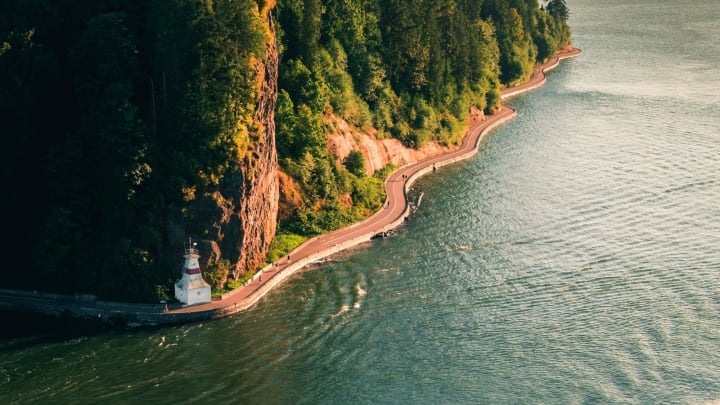
About the Creator
Jesse Warewaa
A writer, I think.






Comments
There are no comments for this story
Be the first to respond and start the conversation.